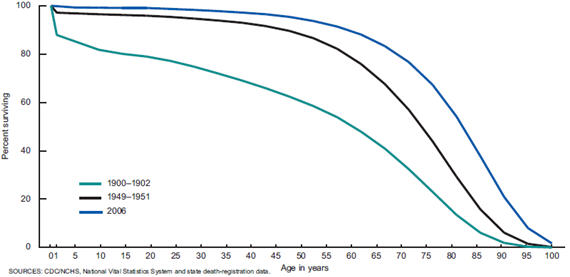Social Security and Life Spans
It's a myth that the problem with Social Security is that people are living much longer after retirement than they used to. The reality is that a whole lot more people are living long enough to draw benefits.
 Amanda Marcotte points me to a counterintuitive Daily Kos essay by Susan Gardner seeking to debunk as a myth the notion that people are now living much longer after retirement than when Social Security was enacted. Her key insight:
Amanda Marcotte points me to a counterintuitive Daily Kos essay by Susan Gardner seeking to debunk as a myth the notion that people are now living much longer after retirement than when Social Security was enacted. Her key insight:
The fact is, men are living less than three years longer, women about five. Yes, there are more people living longer because they didn’t die at age 3 of whooping cough or polio, but the life expectancy for an individual has not been extended very much at all once age 65 is reached. Disturbingly, pushing the retirement age out five years as is currently proposed actually means an individual male retiree today is at risk of being cheated of two years more retirement than our supposedly drastically shorter-lived forebears received more than half a century ago.
And, it’s true: Life expectancy at age 65 went from 12.2 years in 1930 to 17.7 years in 1997 for the total population. And life expectancy at age 85 has changed even less.
But, while that’s one important measure — how long you’re likely to draw retirement benefits once you’ve retired — it’s not the only one that matters. The fact of the matter is that people used to a whole lot more likely to spend their whole lives working and then die before turning 65 and drawing any retirement benefits at all!
Here’s a graph put out by the Centers for Disease Control on the the percent of each age cohort surviving at a given age over time:
While it’s true that death in very early childhood is the chief reason the average lifespan was so much shorter a century ago, that had largely changed by the end of WWII. But even aside from that, the rate of survival was very much lower for those born in 1900 — young workers at the time Social Security was enacted — and those born in 1949 and nearing retirement now at every point along the curve.
For those born at the turn of the 20th Century, less than fifty percent could expect to see one dime from Social Security. But the vast majority could expect to pay into the system, supporting existing retirees, for twenty to thirty years.
For those born in 1949, though, more than 70 percent expect to live to 65.*
For those born in 2006, it’ll be more than 90 percent.
Yes, those who retire will only get benefits longer. But vastly larger numbers will actually draw benefits. From a purely actuarial standpoint, that makes a huge difference.
Now, I don’t think we can morally justify raising the retirement age much further. At least, not across the board. For a coal miner, 65 is still old. But we’ll have to either have different retirement ages for people, like me, who sit in front of a computer all day, means test benefits, or tax existing workers more to keep this system afloat.
_____________
*As a technical matter, the retirement age has been phasing towards 67 since the mid-1990s. But Gardner is arguing that we shouldn’t be doing this.







As a statistical lesson, the fact that the “life expectancy at age 65” has not changed much has merit.
(I have a higher life expectancy than you James, for the same reason … I’m older.)
As a eureka moment for Social Security, not so much. It’s like constructing an over-specific example, and then saying “hey, my over-specific example does not capture the whole problem!”
I’d say this isn’t quite general enough either:
The crux is the average benefit drawn by contributing workers.
In the past, more of those contributing workers died before reaching 65, or drawing any benefits at all.
Should I do the patriotic thing and hurry up and die?
In related news, I saw a study which purported that bicycle riding was net-net bad for the environment … because it increased life expectancy.
The only thing that matters is the expected tax revenue versus expenditures.) Roughly, this is equivalent to the proportion of workers paying into the system to the number of beneficiaries. The point is that the proportion of beneficiaries is not rising due to increased longevity.
More people qualify for SSA!? Doesn’t that also mean more people have paid into it?
Not really. Your survivors will draw….. Social Security benefits.
Having been struck by a car while cycling (while on my honeymoon but that’s another story), I’m not so sure.
The Social Security system currently handles two main sorts of cases: disability and retirement. In my view we should create a third category to handle the circumstances that James has identified above, people who work in jobs that are physically punishing, e.g. miners, fishermen, etc. It can be administered based on SIC and occupation reported for the last five years of income so it wouldn’t require additional paperwork.
I’m doing my part to help. I smoke like a house burning down, drink two liters of rum every week, and I just put a motor on one of my bicycles for lazy days.
Ouch, Dave.
This is more for humor value than anything. Its one of those things where correlation could be misunderstood. How many get on a bike because they feel like they could ride for miles? How many stay off because they feel poorly?
But, FWIW:
Wide ranging use and abuse of numbers follows:
http://www.terrapass.com/blog/posts/the-bicycling-p
Statistics is never used to find a conclusion.
Statistics is only used to prove a conclusion.
Another way of representing this dynamic is to examine the ratio of contributors-to-beneficiaries: http://bit.ly/bJYxLD
Not a pretty story.
Well Hugh, we really need the AI and the robots.
Which is why all science is bogus and none of it should be trusted.
It’s so hard to tell who is doing parody these days. But certainly anyone who believes this should get off the internets, which wouldn’t work without the pivotal statistical observations of Claude Shannon.
All I can say is, there ain’t no way I can work till 70, or 67, or 65…
I’ve got bursitis, tendonitis, arthritis, more “itises” than you can shake a stick at. (Now they want to “replace” my thumbs) I’m 52 and if I make it to 60 and still swinging a hammer, I’ll be lucky.
Not sure how all this is going to work out, but maybe you get lucky.
Grewgills;
I didn’t know that you were such a retrograde, Thanks for the clarfication of your views!
BTW; My comment applies to the misuse of statistical analysis, not It’s fundamental validity.
Many Pseudointellectuals have rejected the application of the true scientific method, in favor of making it a religion, or worse , a bludgeon for the purpose of a false claim to high ground.
The claim to true science has been the claim of charlatans at least as often as has the claim to true religion.
You should learn to question instead of choking on gnats and swallowing cows. That is, after all, the very beginning of science and the gateway to knowledge.
Phrenology anyone??
Kind of makes the anti-smoking campaign the culprit? Not to mention all the medical research going on to defeat or delay death from cancer and other diseases. Plus we should support a machine gun in every closet and encourage Meth use.
We should just do away with Social Security and follow Vin Broccoli’s plan.
@floyd
“Many Pseudointellectuals have rejected the application of the true scientific method, in favor of making it a religion, or worse , a bludgeon for the purpose of a false claim to high ground”
What the hell does that mean?
This article does a good job of explaining the pay-out portion of SS, but does nothing to address the issues associated with the changes in the number of people who pay in vs. the number of people who collect. If we really want to make this fair, people who belong to a more numerous generation (i.e. baby-boomers) should have to pay into the system at a higher rate, or receive lower benefits than the do currently in order to save up money for when more of them are retired.
Sam ;
Science+ dogma= a no-no
Amanda Marcos? Is Marcotte a shoe horse?
Science+ dogma= a no-no
Well, the right has simply abandoned science, so it’s not really an issue for them…